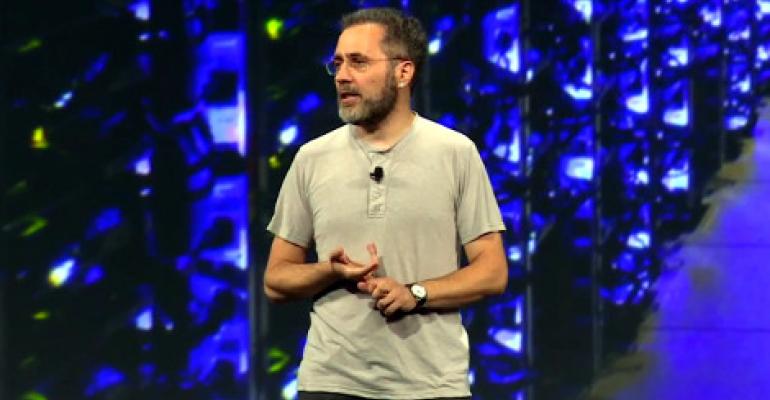After playing an oracle of sorts, asked to share his thoughts on the future of computing, Urs Hölzle ended up defending Google’s future in the enterprise cloud market on stage at GigaOm Structure in San Francisco Tuesday.
While the company is one of the leaders in Infrastructure-as-a-Service, due to its advanced technological capabilities and scale, it has not yet earned a reputation of a serious player in the enterprise market. Interviewing Google’s VP of technical infrastructure on stage at Structure, Stacey Higginbotham, a senior editor at Fortune, asked why that is.
“Reputation lags reality, but I think reputation will catch up with reality,” Hölzle replied, promising visible change “soon.” Google has several announcements in the works that will remove any doubts about its commitment to the enterprise, he said, while also acknowledging that the company is “coming from behind” in this market.
Taking the long-term view, cloud today is where smartphones were in 2007, Hölzle said. In other words, this is just the beginning.
“It’s just so early-stage in the grand scheme of things,” he said. While Amazon and Microsoft are leading today, owners of most IT workloads have not yet picked a cloud for those workloads.
“The next five years in cloud are going to [bring] much more evolution than in the last five years. And I think we’re going to be the Android in that story.”
When Apple released the first iPhone in June 2007, Google’s now open source mobile operating system was unheard of. Today, Android runs on about 80 percent of the world’s smartphones, according to the most recent figures from the market research firm IDC.
Speaking on the same stage, well-known Silicon Valley venture capitalist Vinod Khosla said if anybody could give Amazon a run for its money in the cloud market, it would be Google or Microsoft. Google, he said, had “staying power” and “generally better technology.”
Microsoft’s strength, according to Khosla, was in its many years of experience in the enterprise market. The company understands enterprise needs and has many ongoing relationships in the space, he said.
Adrian Cockcroft, another superstar technologist and VC, noted that Google to date has not been playing the same game in the cloud as Amazon and Microsoft have been. The latter two have been expanding the scale of their cloud infrastructure, building more and more data centers around the world at break-neck pace, while Google has been focusing more on bringing down the cost of its cloud services.
Hölzle didn’t fail to mention the low cost of using Google’s IaaS cloud. “We’re by far the undisputed price leader, both in storage and in compute,” he said. “That is something that I would expect to continue.”
Gartner considers Google a “visionary” in the IaaS market who is ahead of other visionaries, such as IBM, VMware, and CenturyLink, but far behind Microsoft Azure and Amazon Web Services.
The fastest-growing need among Gartner’s clients – enterprises, mid-market businesses, and technology companies “of all sizes” – is to replicate their in-house data centers in the cloud, the firm says. In other words, they want to have the same control over IT operations they have on-premise, even if they do use third-party managed services. And that’s the lens Gartner uses to look at the IaaS market.
“Although Google has significant appeal to technology-centric businesses, it is still in the rudimentary stages of learning to engage with enterprise and midmarket customers and needs to expand its sales, solutions engineering, and support capabilities,” Gartner cautioned in its Magic Quadrant report on the IaaS market published in May.
The research and consulting firm heard from prospective Google customers who had a hard time getting a hold of the company’s sales staff or receiving guidance on appropriate solutions.
While focusing on “cloud-native” applications, Google has lagged in building a strong case for other workloads. “Google needs to earn the trust of businesses,” Gartner said. The company “lacks many capabilities important to businesses that want to migrate legacy workloads to the cloud.
It also lacks a strong partner program. It has started building one, however, revolving around Kubernetes, its open source app-container cluster management software.
Hölzle also mentioned that, while Google doesn’t have the reputation of a long-time enterprise player, it has in fact been selling enterprise products for a long time, starting with its on-premise enterprise search, launched 13 years ago. “And we have lots of enterprise customers already today, who are happy customers,” he said.





